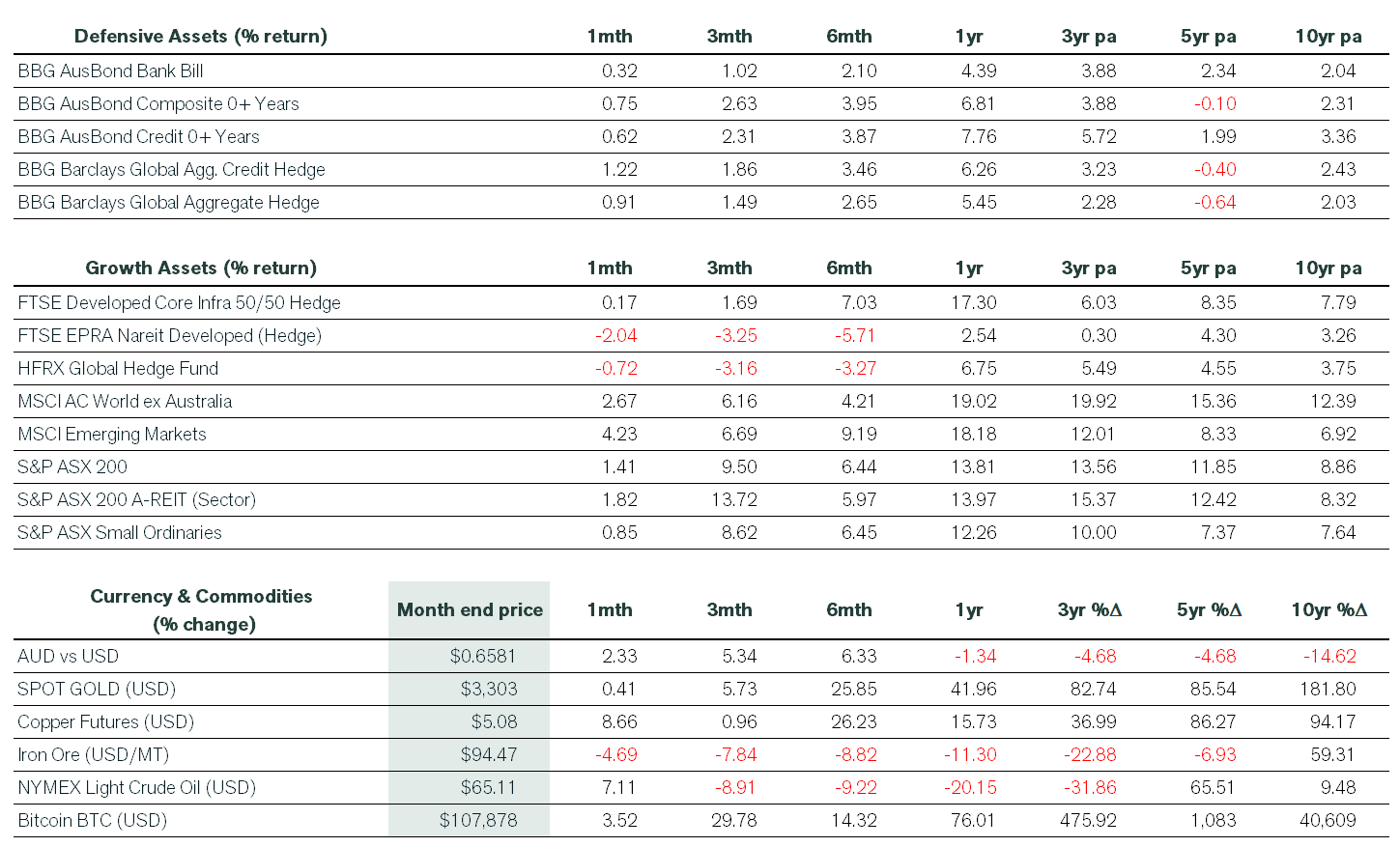July 2025 Economic & Market Review – Stocks Climb, Inflation Eases, and Tariffs Hit Copper
1. US stocks kept climbing: July marked another winning month for US markets, with the S&P 500 and Nasdaq both hitting record highs. Low volatility and strong early earnings gave investors confidence.
2. Australian shares started the year strong: The ASX 200 gained 2.4% in July, led by healthcare, energy, and real estate investment trusts. Small caps and A-REITs outperformed the broader market, while financials slipped.
3. Growth lagged value in Australia: Locally, value stocks outperformed growth, the reverse of the global trend. Globally, megacap tech continued to lift growth stocks ahead of value.
4. Bonds were quiet but yields eased late in the month: Higher yields weighed on fixed income early, but softer jobs data and cooler inflation helped bring yields down as July ended.
5. Copper prices plunged on tariffs: A sudden 50% US tariff on semi-finished copper products—paired with an exemption for refined copper—triggered a swift sell-off in futures markets.
6. Australia’s job growth slowed, inflation eased: June saw only 2,000 new jobs and a fall in full-time employment. Inflation dropped to 2.1% annually, giving the RBA more room to keep rates on hold.
7. Global growth showed mixed signals: US GDP rose at a strong 3% pace in Q2, China’s growth slowed slightly but stayed near target, and Eurozone growth improved as inflation hit the ECB’s 2% goal.
Market commentary
There were several key news items during the month of July, headlined by the passing of the One Big Beautiful Bill Act. The package reduced uncertainty around the funding of Trump’s domestic agenda and made his 2017 tax cuts permanent, while delivering promised new tax breaks. Though the package adds significantly to public debt, it also cuts health and food safety-net programs and zeroes out dozens of green energy incentives.
Other global news focused on announcements of trade agreements with key trading partners, including Japan and the EU. Financial markets viewed this positively, as a reduced risk of an escalating trade war.
While global markets performed more moderately in local currency terms, unhedged domestic investors benefited from the weaker Australian dollar throughout the month. Global equity markets continued to move higher through July with the unhedged MSCI ACWI ex-Australian index up 3.4% in Australian dollar terms (+2.2% in local currency). The weaker Australian dollar also benefited emerging market equities, contributing 40 basis points to its return of 3.8%.
In the US, the US S&P 500 was up for a third consecutive month, as was the Dow Jones Industrial Index. Meanwhile, the tech-heavy Nasdaq rose for the fourth straight month. Both the S&P 500 and Nasdaq reached record highs in July, helped by low volatility and a strong start to the quarterly earnings season.
Despite a surprise pause to the cash rate by the RBA in early July, domestic investors enjoyed a strong start to the new financial year. The ASX 200 climbed 2.4% including dividends, only to be outpaced by its small cap peers (+2.8%) and the AREIT sector (+3.3%). Healthcare led the way following a difficult period, with the sector clouded in policy uncertainty. Energy was strong on the back of higher oil prices and a takeover bid for Santos. It is noteworthy that both sectors remain in the red over the past twelve months. At the opposite end of the spectrum, Financials lost ground in July as the major banks gave back some of their gains. Overall, the MSCI Australia Growth index underperformed its Value equivalent, while the opposite was true at the global level, thanks to strong performance by megacap tech stocks.
Outcomes across the fixed income markets were relatively muted in July, as higher yields weighed on returns. Domestic fixed interest finished marginally in the red, after the RBA surprised markets at its July board meeting and held the cash rate at 3.85%, preferring to wait for the quarterly inflation data. Yields subsequently eased throughout the month after the release of weak jobs data and better-than-expected consumer inflation data.
Finally, copper prices slumped sharply in July after Trump implemented 50% tariffs on semi-finished copper products, while unexpectedly exempting refined copper. This caused a dramatic unwind of speculative positions and erased a premium that had built up in US copper futures markets, with traders racing to redirect copper supplies originally destined for the US.
Economic commentary
Australia
In domestic economic news, the June labour market report was weaker than expected as employment increased by just 2000 jobs, following an unexpected fall of 1000 workers in May. In June, part-time employment grew by 40,000 people, offset by a 38,000-person fall in full-time employment. Later in the month, CPI inflation eased to 0.7% in the June quarter and to 2.1% from a year ago. Trimmed mean inflation – the RBA’s preferred measure – slowed to 0.6% over the quarter and to 2.7% annually.
United States
The passing of the One Big Beautiful Bill Act will add $3.4 trillion to the nation’s $36.2 trillion debt, largely through lower tax revenues, according to the nonpartisan Congressional Budget Office.
Meanwhile, US consumer prices increased by the most in five months in June, up 2.7% from a year ago, versus 2.4% in May. Excluding food and energy, core inflation increased 2.9%, up from 2.8%. Also of note, an advanced estimate of second quarter US economic growth revealed an annualised 3% expansion due to a surge in net exports.
Rest of the world
Elsewhere, China’s economy grew 5.2% in the second quarter from a year earlier, slowing from the first-quarter’s 5.4% pace. China has set a full-year growth target of around 5%. The world’s second-largest economy has so far avoided a sharp slowdown, in part due to policy support and a fragile trade truce with the US. Also, China’s home prices fell at a faster pace in June, underscoring growing speculation for additional measures to revive the property market.
Finally, June quarter GDP in the Euro Area expanded 1.4% versus a year ago, according to preliminary data. This was cautiously greeted by markets, as inflation is now at the European Central Bank’s 2% target. By month’s end, traders were expecting no further cuts to the ECB’s key policy rates.
Pete is the Co-Founder, Principal Adviser and oversees the investment committee for Pekada. He has over 18 years of experience as a financial planner. Based in Melbourne, Pete is on a mission to help everyday Australians achieve financial independence and the lifestyle they dream of. Pete has been featured in Australian Financial Review, Money Magazine, Super Guide, Domain, American Express and Nest Egg. His qualifications include a Masters of Commerce (Financial Planning), SMSF Association SMSF Specialist Advisor™ (SSA) and Certified Investment Management Analyst® (CIMA®).


